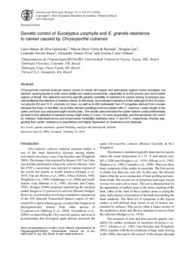Genetic control of Eucalyptus urophylla and E. grandis resistance to canker caused by Chrysoporthe cubensis.
Genetic control of Eucalyptus urophylla and E. grandis resistance to canker caused by Chrysoporthe cubensis.
Author(s): GUIMARÃES, L. M. da S.; RESENDE, M. D. V. de; LAU, D.; ROSSE, L. N.; ALVES, A. A.; ALFENAS, A. C.
Summary: Chrysophorte cubensis induced canker occurs in nearly all tropical and subtropical regions where eucalypts are planted, causing losses in both wood quality and volume productivity, especially so in the warmer and more humid regions of Brazil. The wide inter and intra-specific genetic variability of resistance to canker among Eucalyptus species facilitates the selection of resistant plants. In this study, we evaluated resistance to this pathogen in five Eucalyptus grandis (G) and 15 E. urophylla (U) trees, as well as in 495 individuals from 27 progenies derived from crosses between the trees. In the field, six-months-old test seedlings were inoculated with C. cubensis. Lesion length in the xylem and bark was measured eight months later. The results demonstrated that xylem lesions could preferentially be used for the selection of resistant clones. Eight trees (7 U and 1 G) were susceptible, and the remainder (8 U and 4 G) resistant. Individual narrow and broad sense heritability estimates were 17 and 81%, respectively, thereby suggesting that canker resistance is quantitative and highly dependent on dominance and epistasis.
Publication year: 2010
Types of publication: Journal article
Unit: Embrapa Forestry
Keywords: Controle Genético, Eucalyptus
Observation
Some of Embrapa's publications are published as ePub files. To read them, use or download one of the following free software options to your computer or mobile device. Android: Google Play Books; IOS: iBooks; Windows and Linux: Calibre.
Access other publications
Access the Agricultural Research Database (BDPA) to consult Embrapa's full library collection and records.
Visit Embrapa Bookstore to purchase books and other publications sold by Embrapa.

